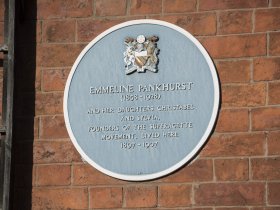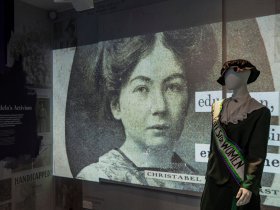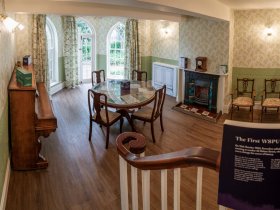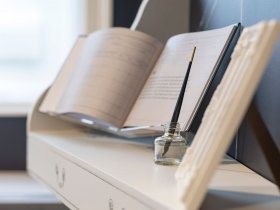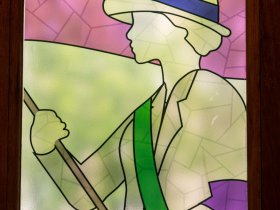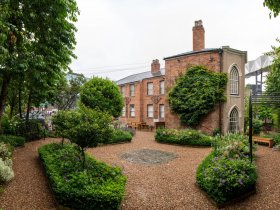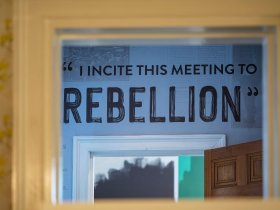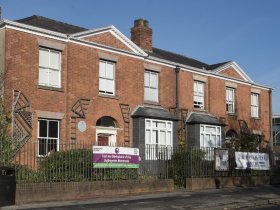Stay in touch with the latest news from AIM and get information on sector grants, jobs and events with our free fortnightly E-News.
At Home with the Pankhurst Family
New permanent exhibition at Manchester’s Pankhurst Centre with thanks to funding from AIM Biffa Award History Makers
The transformation of the Pankhurst Centre exhibition space is incredible thanks to its new permanent exhibition, At Home with the Pankhurst Family. Its opening also marks the reopening of the Grade II* listed former home of Emmeline Pankhurst, with bookings now being taken for visits from 29 August onwards.
The exhibition enables visitors to get to know the people behind the iconic Pankhurst name; their lives, influences, tragedies, resourcefulness and the factors that turned them into the campaigners that they became. This includes how they used their skills, notably Sylvia as an artist, and how their campaigning meant that their own aspirations were sometimes left unfulfilled, Adela’s career dreams of being a teacher put to one side to join her mother and sisters in their work to achieve the enfranchisement of women. It also includes looking at the influences from both within the family and the radical city of Manchester in which they lived.
At Home with the Pankhurst Family is a significant milestone for this small museum, which is the country’s only museum dedicated to female suffrage and exploring what the legacy of this means; past, present and future. That it has been made possible is thanks to funding from AIM Biffa Award History Makers, as part of the Landfill Communities Fund.
The Pankhurst Centre museum occupies the ground floor of 62 Nelson Street, with the room layouts very much intact and the story flowing from the entrance hallway, where visitors are reminded of the campaigners who saved the building from destruction in the 1970s, to the parlour where Emmeline Pankhurst held the first meeting of what would become known as the suffragettes.
Ruth Colton, Heritage Manager of the Pankhurst Centre, says, “Our aim is to give visitors the chance to discover more about the family behind the Pankhurst name and how they became both change makers and historical icons. The exhibition’s striking boldness reflects the strength behind the campaigning of the suffragettes and yet we are also reminded that this began from the setting of a family home.”
Taking you through the At Home with the Pankhurst Family experience
In room one we find out more about the Pankhursts as a whole family than has ever been previously explored in an exhibition, revealing more of their private lives, their early lives and about them as individuals – how they lived and worked in this space and what led them to be a family of activism. It is an intense experience with the loss of a son following the loss of a husband and the reduction in circumstances that brought them to this house, with strong graphical imagery forming the backdrop to a narrative that is illuminated by photographs, artefacts and objects.
Then in room two visitors find themselves confronted by an audio visual experience, which immerses you into the environment as the Votes for Women campaign reaches its pinnacle, and everything associated with this. Militant tactics, clashing viewpoints and media headlines are just some of the dynamics that are at play and help to convey the shockwaves that were generated by the suffragettes.
And from the very visceral atmosphere of room two visitors finds themselves in the Edwardian parlour of this family home; that spine-tingling moment when you realise that this is the space in which the first gathering of the suffragette movement took place and Emmeline Pankhurst first uttered the immortal words “Deeds not words” on 10 October 1903. As you take a seat at the table you are transported to this moment, with letters, photographs and accounts helping to take you there. There are also stories of how the Pankhursts’ home was not only used as a place to meet, plot and plan, but as a place of refuge for suffragettes who had been released from prison, including Annie Kenney.
In the parlour you are also reminded that as well as Emmeline’s role as a Registrar of Births and Deaths, the reduction in financial circumstances following the death of her husband Richard, meant that during her time at Nelson Street she revived the interior business she had once run from her shop in London, Emerson and Co. The house was used as a showroom for her collections and the dresser in this room came from Emerson and Co – bought by Emmeline’s brother Herbert it stayed in the Pankhurst family until it was donated to the Pankhurst Centre in 2016.
Bringing the whole experience together and reflecting upon the Pankhurst Centre of today and its vision for the future a project film is screening in the temporary exhibition space. And travelling along the walls is a timeline, Remembering Resistance, which shares critical moments of women’s activism over the hundred years following the granting of the vote to some women. This is also the area that will be used for activities, from workshops to family friendly events, and is where you can visit the pop up shop.
Then finally spend a little time in the tranquil Pankhurst Centre garden, which was created thanks to over 500 Crowdfunder supporters in 2017. It’s a beautiful way to enjoy the suffragette colours of green, white and purple through nature and to reflect on their meaning and the powerful story they represent. On museum open days the garden will also be home to Coffee Cranks Co-operative serving hot drinks, sandwiches and cakes.
The exterior of the Pankhurst Centre is also looking a bit sharper, thanks to some urgent works that have been carried out to the pillars and stone steps, which has been made possible thanks to the Friends of the Pankhurst Centre. And the front door and railings have been given a new coat of paint!
Specialist museum consultancy Mather & Co. has created the design for At Home with the Pankhurst Family, working closely alongside the Pankhurst Centre’s team and a panel of volunteers who form the Pankhurst Committee. It is hoped that the reimagination of the museum is the start of a journey that will ultimately lead to the restoration of 60 and 62 Nelson Street Manchester, the location that for many years acted as the hub for what would become one of history’s most renowned political movements.
Booking details
Public bookings for the Pankhurst Centre will open on Thursday 29 July 2021 for slots from Sunday 29 August. Entry will be FREE with a suggested donation of £5. Opening hours will be Thursday and Sunday, 11am to 4pm. For further information and to book tickets visit www.PankhurstMuseum.com

